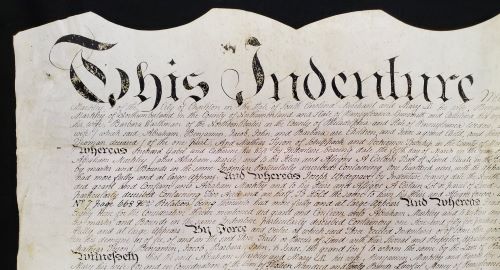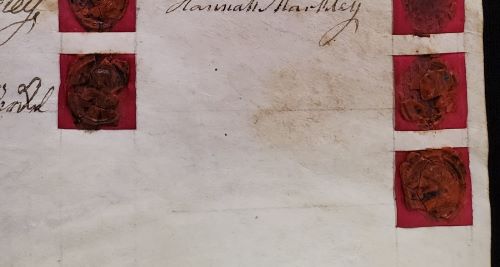New acquisition: Markley-Tyson deed, Skippack, 1803
Written by Forrest Moyer on June 24, 2021

Recently Mary Jane and Hiram Hershey donated several old deeds, including one for the farm where her grandfather Abraham Mensch grew up, in Skippack Township. The address today is 4030 Mensch Rd, Schwenksville, just outside Skippack village.
The deed is from 1803, many years before the Mensch family owned the property. Abraham Markley (1723-1800) purchased this farm of 100 acres in 1751. After he died with no will in 1800, his heirs sold the farm to brother-in-law Mathias Tyson. Each sibling and their spouse signed off on the deed. Mother Barbara (Ickes) Markley is not mentioned as an heir, nor does she sign. At age 82 in 1803, perhaps she was incapacitated. She died in 1808.
This is a beautiful and well-preserved family deed. In addition, it features some interesting people; and serves as an example of fluid surname spellings during the transition from German to English. Click photos to enlarge.
Abraham and Barbara Markley were members of the Lutheran Church at Trappe, but were buried close to their home, in the Lower Skippack Mennonite Cemetery.
Son-in-law Mathias Tyson (1745-1825) was also Lutheran, though raised Mennonite. He and wife Elizabeth Markley are buried at Lower Skippack. As purchasers, Mathias and Elizabeth Tyson did not sign this deed, but held the document as evidence of their purchase and ownership of the property.
Signers of the deed
Those selling the land were:
Abraham and Mary (Gasser) Markley
Abraham Markley (1745-1824) was a Revolutionary War veteran and merchant in Charleston, South Carolina. According to the Markley genealogy (1884), he “was engaged in business, dealing in carriage and farming implements, which, part or all, were shipped to him by his brothers, John and Benjamin Markley, of New Hanover Township.” His gravestone at St. John’s Lutheran Cemetery in Charleston reads: “Born in Pennsylvania. Removed to this city in 1774 and resided here until his death. Aged 79 years 6 months and 21 days. He was a virtuous man, and devoutly sought salvation through faith in Jesus Christ. He came to his grave in a full age.”
Abraham signed the deed in English, spelling his name “Markley”. Wife Mary Magdalen also signed in English. They must have been in Pennsylvania for a visit or business trip on January 17, 1803 when the deed was made.

Benjamin and Hannah (Wentz) Markley
Benjamin Markley, Esq. (1751-1819) was also a Revolutionary War veteran (captain in the militia) and “storekeeper” per this deed. He was a surveyor, justice of the peace, and associate judge of Montgomery County for nearly 20 years. He probably made and wrote this deed, including the calligraphy, decorative shaping, and seals neatly secured with scarlet ribbon. Based on the names of witnesses (Benjamin’s son Jonah and neighbor Anthony Bitting), the deed was likely signed at his home in New Hanover Township.
From the Markley genealogy:
[Benjamin Markley] was a competent and careful scrivener; drew many wills, deeds, petitions and contracts for the people of his community; and made many settlements for administrators and executors of estates. His penmanship was neat and legible, and his accounts, both in English and in German, were patterns of exactness and skill.
Judge Markley owned and occupied the brick dwelling on the Great Road, near Krebs’s famous inn of that time. [The address today is 2616 Big Road, Frederick, PA.] Through this building, which still stands, runs a broad hall; on the left side is the room which was his office; while to the right was the parlor in which Hannah, his esteemed helpmate, held sway. A generous hospitality pervaded this home.
The Judge was a stout man, of light complexion, and of dignified appearance; sociable in disposition; fond of a joke and of good living; genial and courteous; popular with all—the rich and poor, the young and old. The school-children always approached him with smiles on their faces, and he was never without a pleasant word to send them on their way rejoicing. In front of his house was a sun-dial, which was an object of lasting interest to them, and in his wagon-shed was a large, hollow bomb shell—a Revolutionary relic, with which the boys tested their strength. He was a Mason, of which fraternity only himself and his neighbor, Colonel Anthony Bitting, were then members in that vicinity. [Bitting had been Markley’s commanding officer during the Revolution.]
Hannah (Wentz) Markley came from Worcester. Amiable in manner and warm of heart, she exerted a refining and elevating influence. The sweetness of her calm, religious life was transmitted to her daughters and through them to later generations, who yet trace its presence. She was beloved by “all the country-side.” Her home was a centre of taste and elegance. The furniture and articles of use and decoration were the choicest and best of their kind. To this day her china, her silverware, and samples of her handiwork are preserved. There are yet living [1884] a few—though they must be three score and ten—who knew, and who speak in terms of highest esteem of, Benjamin and Hannah Markley.
They both signed the deed in English, spelling their name “Markley”.

Jacob and Christina (Antes) Markley
Jacob Markley (born ca. 1755), was a gunsmith in the town of Northumberland in central Pennsylvania. Some of the guns he made have survived and are valuable today. You can read more and see pictures in the American Society of Arms Collectors Bulletin #112.
Jacob and wife Christina were named as parties to the sale, but were unable to attend the deed signing. These empty blanks were meant for their signatures.

Before the deed could be recorded, Jacob and Christina’s share had to be transferred. On the reverse of the deed, Benjamin Markley wrote a second deed for their 1/7th share, stating that as of August 12,1803, he and Hannah are transferring the share they received from Jacob and Christina in a separate deed of March 3rd, so that transfer to Mathias and Elizabeth Tyson could be complete.

The deed was then taken to Norristown and filed with Recorder of Deeds Thomas Potts, who signed and added his own seal on September 20, 1803.

John and Elizabeth (Hiser) Markley
John Markley (1760-1820) was a successful blacksmith in New Hanover Township. His property is now the Bella Vista Golf Course on Fagleysville Rd near Gilbertsville. The stone house that he built in 1802 is home to the “Markley Grille”, and his large barn has been converted to an event venue called “La Massaria”.
The Markley genealogy (1884) states that while John was “not so conspicuous in public affairs as his brother Benjamin, [he] was a man of wealth and influence.” One of his daughters married Enos Benner, who published the popular German-language newspaper Der Bauern Freund [The Farmer’s Friend] at Sumneytown.
John signed his name in English with the spelling “Marckley” and Elizabeth signed in German “Merkel”.

Barbara Markley Warthman
Barbara Markley Warthman was the only sister in the family (other than Elizabeth Tyson). In 1803 she was a widow and resided in the Northern Liberties section of Philadelphia.
She signed in German. It was common in the 18th century for girls to receive less formal education than boys. Though Barbara’s brothers could write in English, she probably never learned English writing, having attended only German-language school.

Isaac and Mary (Hiser) Markley
Isaac Markley (1773-1817) was a nephew of the other sellers. He was the sole heir of his father, Isaac, their brother, and was therefore entitled to a full 1/7th share. Isaac Sr. died at age 33 in 1773, the same year Isaac Jr. was born. Isaac Jr. was a farmer in Limerick Township at the time of this deed, but later kept a tavern in Jeffersonville near Norristown.
He signed in English with spelling “Marckley” and wife Mary signed in German “Maria Markel”. Mary was a sister to John Markley’s wife Elizabeth Hiser.

Thanks to Mary Jane Hershey’s ancestors for preserving this interesting document, and to Mary Jane and Hiram for donating it.






